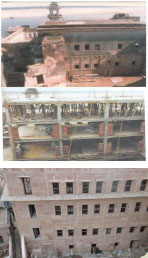The Varanasi Heritage Dossier/Darbhanga Ghat
Detailed description of each heritage Site - Ranamahal Ghat to Tripurabhairavi Ghat


Location
[edit | edit source]25º 18.335’ North and 83º 00.566’ East (Darbhanga Ghat, centre).
Exact location on a map
[edit | edit source]Darbhanga Ghat and Munshi Ghat
Area
[edit | edit source]0.052ha (the two ghats and nearby area)
Historical/cultural/natural significance
[edit | edit source]
Sridhara Narayana Munshi, a finance minister in the estate of Nagpur had built this ghat and partly the palatial building. After his name it was called Munshi ghat. In 1915 the Brahmin king of Darbhanga (Bihar) purchased this ghat developed in the form what it later on known as Darbhanga Ghat. In fact, this is an extended form of the Munshi Ghat.
Description and History
[edit | edit source]The palatial building of Darbhanga Ghat is made of sandstone of Chunar, with a beautiful porches and Greek pillars. The strong steps for the roof were built in 1930. Of course, this area has been importance in the puranic context, but for its grandeur and architectural style this palace is very important.
In 1994 the Darbhanga palace was purchased by the Clarks Hotel Group, who named it as Brajrama Palace, and planned to transform it into five star hotel. They have already demolished almost half of the structure from the back. Its back perimeter is being extended and its height raised in order to make suitable for the use of the planned hotel. Of course it would be a lovely setting for the hotel with a view to attract a high class rich tourists from the west, however by the growth of essential infrastructural facilities the whole environment will face the problem of pollution, socio-psychological depression and harder common life.
Present state of conservation
[edit | edit source]The Clarks Hotel Group is no way interested to preserve and maintain the heritage, aesthetic sense and to support the wellbeing of the local community. Thanks to some activist organisation which with the support of local people and judiciary presently stopped the demolishing and conversion process into hotel.
Specific measures being taken for conserving the specific property
[edit | edit source]It is expected that by the support of active people participation, awareness to save the age-old rich heritage, and system of Master Plan Development (and its judiciary control) the heritage will be protected and conserved for the better befit to the society.
Ownership
[edit | edit source]The palatial building by Clarks Hotel Group; the ghat area by the Municipal Corporation.
